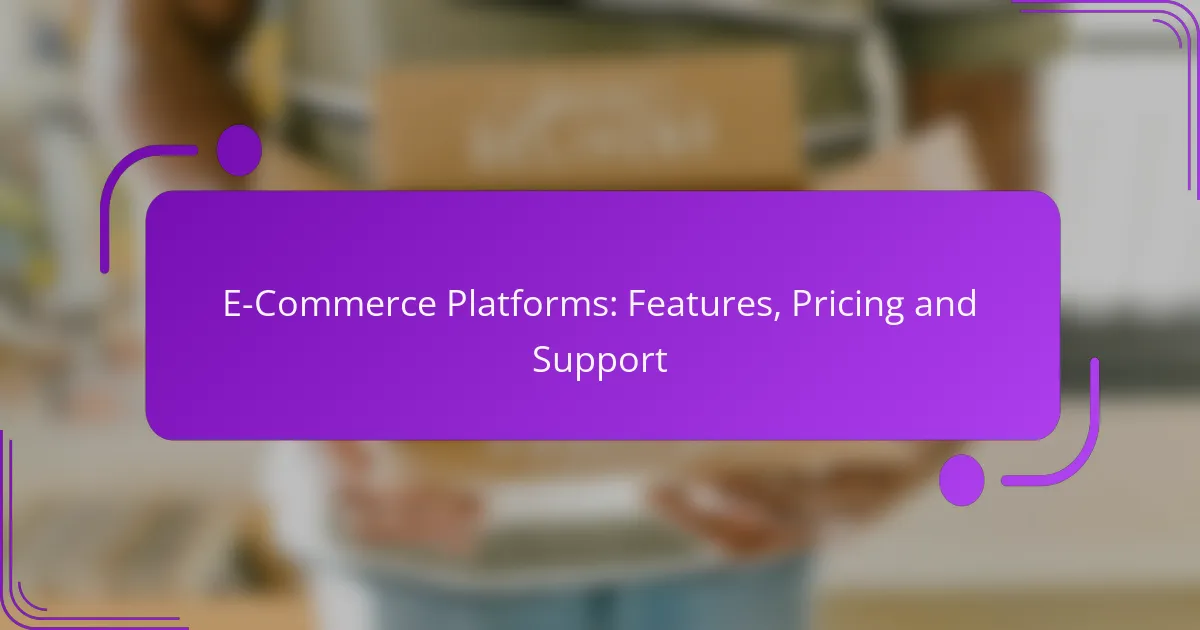Choosing the right e-commerce platform is crucial for small businesses looking to establish a successful online presence. With options like Shopify, WooCommerce, and BigCommerce, each platform offers unique features, pricing structures, and support levels tailored to various needs and technical skills. By focusing on essential functionalities such as payment processing and inventory management, businesses can enhance user experience and streamline operations.

Which e-commerce platforms are best for small businesses?
Small businesses often benefit from user-friendly e-commerce platforms that offer essential features at reasonable prices. Shopify, WooCommerce, and BigCommerce are among the top choices, each catering to different needs and technical expertise.
Shopify features and pricing
Shopify is known for its simplicity and robust features, making it ideal for small businesses. It offers a range of plans starting from around $29 per month, which includes hosting, a customizable storefront, and payment processing.
Key features include mobile optimization, a variety of templates, and integrated payment gateways. Additionally, Shopify provides a user-friendly dashboard that allows for easy management of products, orders, and customer data.
WooCommerce benefits for WordPress users
WooCommerce is a plugin for WordPress that transforms a standard site into a fully functional e-commerce store. It is free to use, but additional costs may arise from hosting, themes, and extensions.
This platform is highly customizable, allowing users to tailor their online store to fit their brand. WooCommerce supports various payment methods and offers extensive documentation, making it suitable for those familiar with WordPress.
BigCommerce scalability options
BigCommerce is designed for growth, making it a solid choice for small businesses that anticipate scaling. Plans start at approximately $29.95 per month, with features that support larger inventories and higher sales volumes.
It offers built-in SEO tools, multi-channel selling capabilities, and no transaction fees, which can be advantageous as businesses expand. BigCommerce is particularly beneficial for businesses looking to integrate with other platforms and marketplaces.
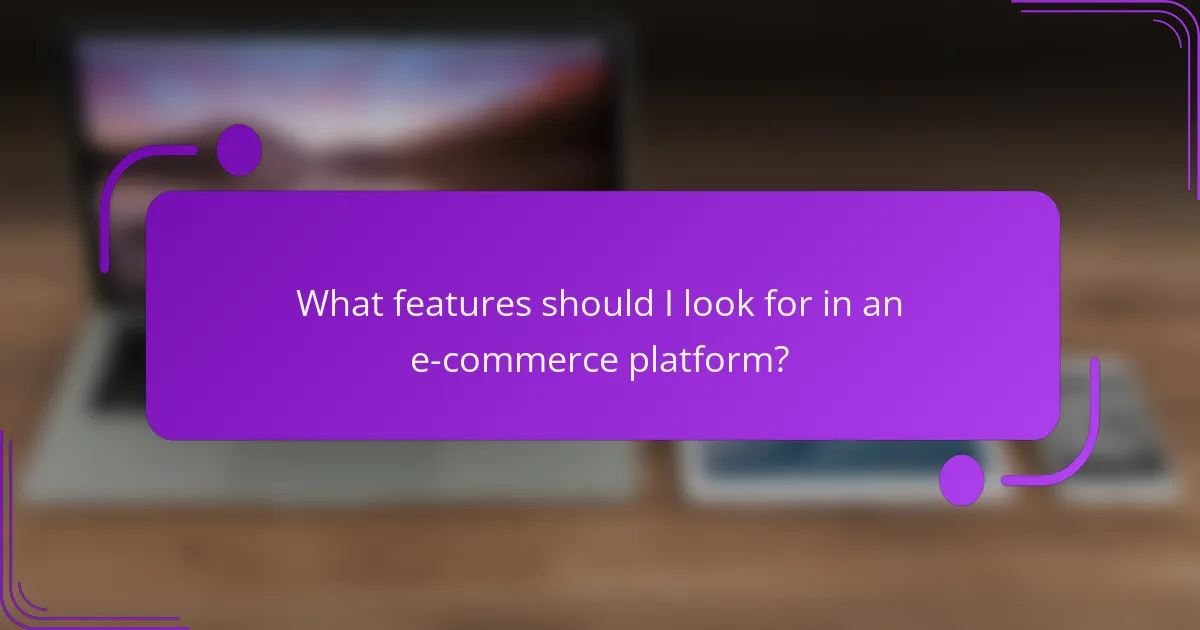
What features should I look for in an e-commerce platform?
When selecting an e-commerce platform, prioritize features that enhance user experience, streamline operations, and support growth. Key aspects include payment processing, inventory management, and mobile responsiveness, which collectively contribute to a successful online store.
Payment processing capabilities
Effective payment processing is crucial for any e-commerce platform. Look for options that support multiple payment methods, such as credit cards, digital wallets, and bank transfers. Ensure the platform complies with security standards like PCI DSS to protect customer data.
Consider transaction fees, which can vary significantly between platforms. Some may charge a flat fee, while others take a percentage of each sale. Evaluate these costs against your expected sales volume to find the most cost-effective solution.
Inventory management tools
Robust inventory management tools help you track stock levels, manage suppliers, and forecast demand. A good e-commerce platform should offer real-time inventory updates to prevent overselling or stockouts, which can harm customer satisfaction.
Look for features like automated alerts for low stock, integration with suppliers, and reporting capabilities to analyze sales trends. These tools can save time and reduce errors, allowing you to focus on growing your business.
Mobile responsiveness
With a significant portion of online shopping occurring on mobile devices, mobile responsiveness is essential. Ensure the e-commerce platform provides a seamless experience across different screen sizes and devices, enhancing usability for mobile shoppers.
Test the platform’s mobile interface to confirm it loads quickly and allows easy navigation. A responsive design can improve conversion rates and reduce bounce rates, making it a critical factor in your selection process.
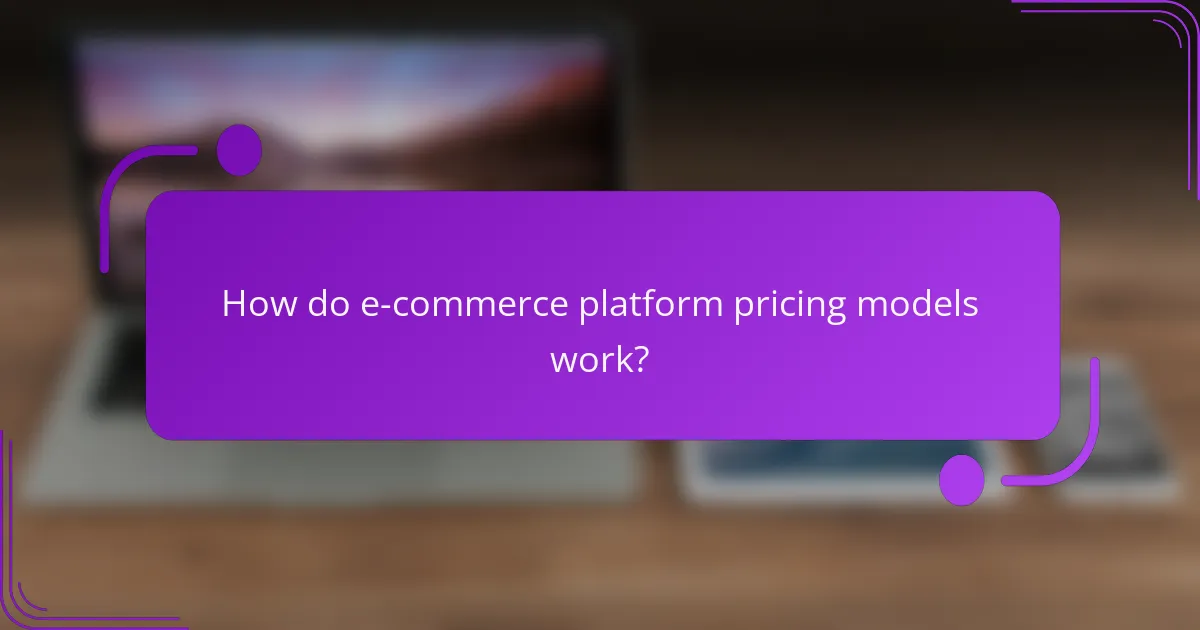
How do e-commerce platform pricing models work?
E-commerce platform pricing models typically involve a combination of monthly subscription fees and transaction fees. Understanding these components helps businesses choose the right platform based on their budget and sales volume.
Monthly subscription costs
Monthly subscription costs for e-commerce platforms can vary widely, generally ranging from around $10 to several hundred dollars. Basic plans often include essential features, while higher-tier plans offer advanced functionalities like custom domains, enhanced security, and additional support.
When selecting a plan, consider the features you need and whether the platform allows for scalability as your business grows. Some platforms may offer discounts for annual subscriptions, which can be a cost-effective option.
Transaction fees overview
Transaction fees are charges applied to each sale made through the platform, typically ranging from 1% to 5% of the total sale amount. These fees can significantly impact your profit margins, especially for small businesses or those with high sales volume.
Some platforms do not charge transaction fees but may have higher monthly subscription costs. It’s crucial to calculate the total cost of ownership by factoring in both subscription and transaction fees to understand your overall expenses.
Free vs. paid plans comparison
Free plans often provide basic features suitable for startups or small businesses testing the waters. However, they may come with limitations such as fewer payment options, storage restrictions, or branding from the platform.
Paid plans typically offer a broader range of features, including advanced analytics, customizable templates, and priority customer support. Weigh the benefits of a paid plan against your business needs to determine if the investment will yield a return through increased sales or efficiency.
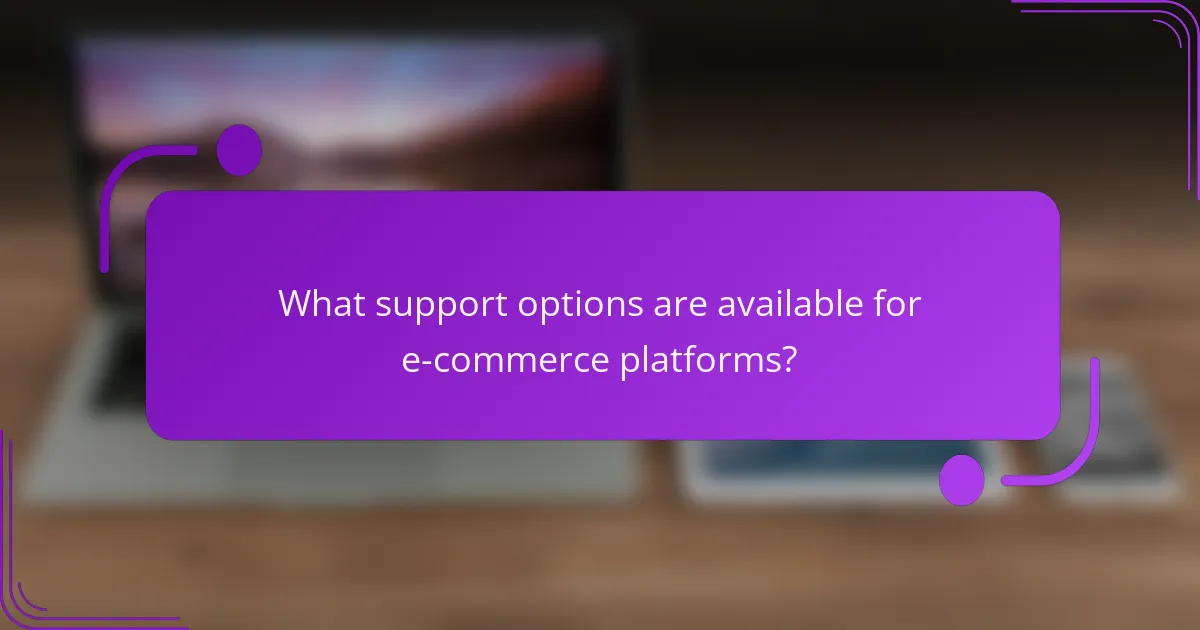
What support options are available for e-commerce platforms?
E-commerce platforms typically offer a range of support options to assist users with technical issues, account management, and general inquiries. The most common support channels include 24/7 customer service, community forums, and dedicated account management services.
24/7 customer service availability
Many e-commerce platforms provide 24/7 customer service to ensure that users can receive assistance at any time. This support is often available through various channels such as phone, email, and live chat. Quick response times are crucial, with many platforms aiming to resolve issues within a few hours.
When choosing a platform, consider the accessibility of their customer service. Look for options that offer multiple contact methods and check user reviews for feedback on response times and service quality.
Community forums and resources
Community forums are a valuable resource for e-commerce platform users, allowing them to share experiences, ask questions, and find solutions to common problems. These forums often include a wealth of user-generated content, tutorials, and best practices that can enhance your understanding of the platform.
Engaging in community forums can also foster connections with other users, providing insights that may not be available through official support channels. Regular participation can help you stay updated on platform changes and user tips.
Dedicated account management
Some e-commerce platforms offer dedicated account management for businesses with specific needs or larger operations. This service typically includes personalized support, strategic advice, and tailored solutions to optimize your online store’s performance.
When considering dedicated account management, assess whether the additional cost aligns with your business goals. This option can be particularly beneficial for businesses looking to scale or requiring specialized assistance in areas like marketing or logistics.
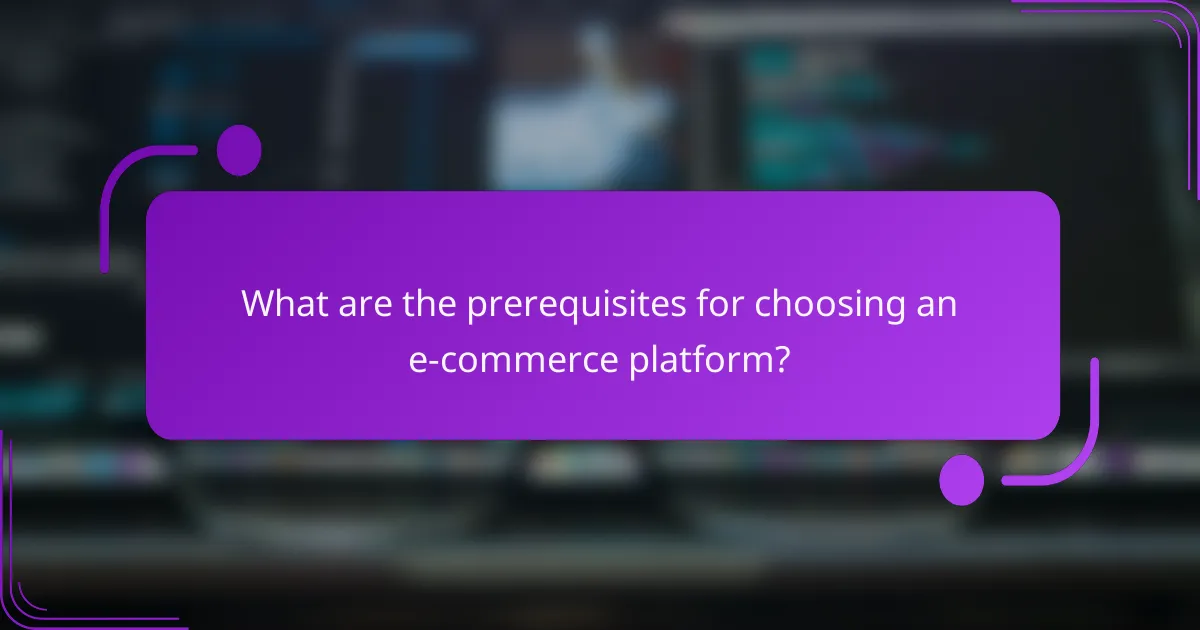
What are the prerequisites for choosing an e-commerce platform?
Choosing an e-commerce platform requires careful consideration of several key factors, including your business size, technical capabilities, and specific needs. These prerequisites help ensure that the platform you select aligns with your operational goals and customer expectations.
Business size and scale considerations
Your business size and scale significantly influence the type of e-commerce platform you should choose. Smaller businesses may benefit from user-friendly platforms with lower costs and essential features, while larger enterprises often require more robust solutions that can handle high traffic and complex transactions.
Consider whether you expect rapid growth or seasonal spikes in sales. Platforms that offer scalability, such as those with tiered pricing or flexible resource allocation, can accommodate your evolving needs without requiring a complete overhaul.
Technical expertise requirements
The level of technical expertise within your team is crucial when selecting an e-commerce platform. If your team lacks technical skills, opting for a hosted solution with built-in support and easy customization can save time and reduce frustration.
For businesses with a more tech-savvy team, self-hosted platforms may offer greater flexibility and control. However, these require a deeper understanding of web development and maintenance. Assess your team’s capabilities and consider investing in training or hiring external experts if necessary.
